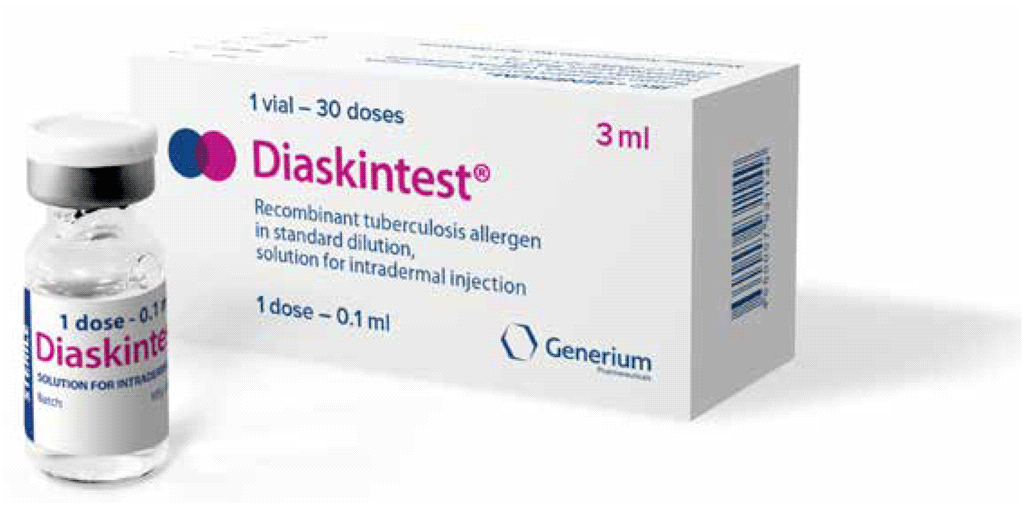Liens transversaux de livre pour 3.2.2 Diaskintest
Diaskintest (Generium, Russian Federation) is a recombinant protein produced by genetically modified culture of Escherichia coli BL21 (DE3)/pCFP-ESAT, diluted with sterile isotonic phosphate buffer solution, with a preservative (phenol). One dose (0.1 mL) of the product contains 0.2 μg of CFP-10–ESAT-6 recombinant protein, and excipients – disodium phosphate dihydrate, sodium chloride, potassium dihydrogen phosphate, polysorbate 80, phenol and water for injection (40).
Fig. 3.2. Diaskintest package and vial

Source: Reproduced with permission of Generium, ©2021. All rights reserved.
The manufacturer recommends administration intradermally and reading of the reaction at the injection site 48–72 hours after injection. The presence of redness and induration should be noted, although the presence and size of induration is critical to interpretation. The presence of blistering, necrosis (skin breakdown) or lymphadenitis is rarely recorded and if seen is interpreted as a “hyperergic” reaction.
Safety
There is limited information on the safety of Diaskintest. Information from the manufacturer indicated that in 2019–2021 a total of 55 774 995 Diaskintest tests were done, in which 27 serious adverse effects and 30 non-serious adverse effects were reported. Unfortunately, there is no further detail on the serious reactions. Published safety studies were recently reviewed systematically (38). In one study of 53 patients with TB disease, six developed severe local reactions with Diaskintest compared with two people developing reactions with TST. In the second study of 25 health care personnel, one participant had a severe local reaction to Diaskintest compared with none with TST. Fever was documented in 32 of 1201 (2.7%) recipients of Diaskintest and other systemic reactions in 1 of 527 recipients (0.2%) (38).
Pregnancy and lactation
The effect of the product on women during pregnancy and lactation has not been studied. Its effects in the developing fetus and reproductive function are unknown. Data on transfer of the product into breast milk during lactation are absent (40).
Contraindications
Contraindications to Diaskintest are:
- acute and chronic (in the exacerbation period) infections, except for TB (possible or presumptive);
- somatic and other diseases during exacerbation;
- common skin diseases;
- allergic conditions;
- epilepsy; and
- hypersensitivity to the active substance or to any of the excipients in the product (40).
 Retour
Retour